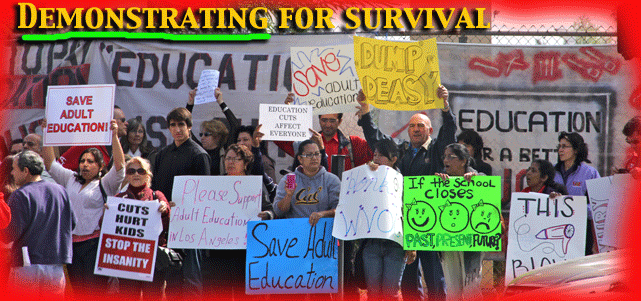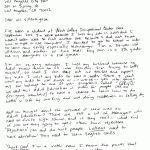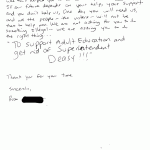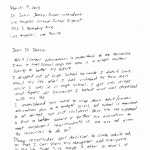SHUTTING DOWN ADULT ED WILL MEAN A TEN PERCENT HIGHER HIGH SCHOOL DROP OUT RATE, SAYS LAUSD’S OWN PROJECTIONS.
BUT IT WILL ALSO AFFECT THE LIVES OF THOUSANDS OF LA RESIDENTS TRYING TO REACH FOR A NEW FUTURE
On Tuesday, March 13, the Los Angeles Unified School board will vote on the question of whether or not the district’s Adult Education program will continue to exist.
Right now the odds against Adult Ed surviving are not considered to be good.
In the newest draft of the district’s so-called worst case budget, which WitnessLA has obtained, all 24 of the district’s adult ad schools are scheduled to have their doors slammed closed.
There are also huge cuts schedule for the district’s arts education and LAUSD’s gifted and talented programs (GATE). The ranks of school nurses and librarians are decimated. And a bunch of continuation schools are marked for shuttering.
But it is the approximately 300,000 adult school students and their teachers who have been the most active in protesting the truly ruinous slashing of their adult ed programs. While the ongoing demonstrations (like the one above at West Valley Occupational Center) have surprised and rattled the board, in the end it still appears that adult ed will be hit by some of the most crippling cuts, which will, in turn, affect thousands and thousands of worried students.
Supt. John Deasy has said repeatedly that he’ll do whatever he needs to do in order not to not raise class sizes in the K-12 grades.
Never mind that in in a recent report sent to the LAUSD board by the Superintendent’s office (that WLA has obtained), according to the district’s own calculations one of the impacts in cutting adult ed is that “the district’s drop out rate would increase by approximately ten percent as students who have fallen behind would not be able to attend adult schools for credit recovery and therefor not graduate.”
[You can read the report yourself here. Scroll to p. 48 for the Impact Statement.]
An increased drop out rate is, however, just one of the impacts that closing adult ed would have on its students, present and future—as evidenced by the stories below.
A FORMER HOMEGIRL EXPLAINS WHY ADULT SCHOOLS MUST STAY OPEN
“See, everybody’s freaked, because of how much this school means to us,” said a 34-year old mother named Rosa, who is a student at West Valley Occupational Center, where approximately 20,000 students a year take classes in ESL, GED prep, various job training and vocational programs…and more.
Rosa (who asked me not to use her last name) said that her adult school classes have changed her life.
Rosa explained that she is a former gang member who grew up in an abusive household and who, during the early years of her life, thought very little about her future.
She managed to leave her gang with the help of a boyfriend whom she eventually married. But her new husband had his own problems; he was addicted to rock cocaine, which gradually led to a spiral downward. “He didn’t know how to fit into society,” she said.
Rosa was three months pregnant with her second child when her husband was shot dead on the street.
After her husband’s death, Rosa kept the household together the best she could for the sake of her kids. But then in 2009, she was fired from her job. Her boss liked her, she said, but told Rosa that her skills weren’t up to par.
“I didn’t know how to type or use the computer. I mean, I was typing with one finger,” Rosa said with a small laugh.
For the next two years, while Rosa searched for employment, she lived at her mom’s house, got by on public assistance, and tried to be a good mother. But she felt terrible about herself. “After the kids went to school, and I cleaned up the house, I’d just sleep. I didn’t want to do anything. Finally I realized, I was really depressed, you know?”
Rosa understood she had to make a change—if not for herself then for her children. A man who was mentoring her son (as part of the mayor’s GRYD program), gave her some advice. Go back to school, he said.
“I told him I’m not good enough. I’m not smart enough to go to school.” she said. “And I meant it.”
But the mentor pushed her. So in September of last year, she enrolled in three classes: office Procedures. Business English, and computer basics.
“I took business English because I needed to learn to talk better to be in the business world.”
Now she’s taking another three: Typing, and Computer Software Application, and Physical Therapy. She goes to class for four hours in the morning and four at night.
“I know if I keep working, I can really make something of myself. And I want to give my kids a better future,” said Rosa.
“This school has changed my life. It changes a lot of people’s lives. That’s why it’s so important they don’t close it down.
“We’re the future,” Rosa said. “Our kids are the future. But to get to that future we need the help that we get from these schools.
“If they close down, what will people like me do? Where will we go to get the skills we need? Really, where?”
THE LETTER WRITING CAMPAIGN
Students from West Valley and other adult ed schools have been writing piles of letters to Supt. Deasy, Mayor Antonio Villaraigosa, and anyone else whom they could think of who might have some influence on the future of adult ed.
Rosa’s letter is below along with that of a woman named Nancy who, like Rosa, is taking classes to “meet employers’ requirements”….”so that I can show my daughter and everyone in my life that I’ve made it, after 10 years of being out of school.”
Her story is also a compelling one, as you’ll see when you read her letter.
[CLICK TWICE ON THUMBNAILS TO MAKE LARGE ENOUGH TO READ]
NOTE: Aaron Liu writing for Neon Tommy has an excellent story on the proposed adult ed cuts and student reaction.





This is a broader topic, but it relates to the post. I don’t know how the city, state, and and federal governments can go on paying for this and every special program that people want. Whenever you support a project, it would be helpful to know how you think that it can be funded with limited resources. Is it ever okay to shrink government?
Adult Education HAD a special protected category up until a few years ago. Arnold decided to take away this in order to “give” districts “more” money. It was pure politics nothing more. The real question is how will we (CA State, L.A. County and Los Angeles) pay for all the people who will join the unemployment and welfare lines. If we can give out all the grants and loans for students to attend all those PRIVATE “COLLEGES”” we see on TV everyday, we can afford to educate the people who are in the most dire need. All the politicians need to do is protect the adult ed funding. A bill will do just fine!!! If you think things are bad in Los Angeles now, wait until the 330,000 students hit the streets with no high school diplomas, GED, English Language Skills or job training,
@ Woody, is it ever OK to preserve a government-funded program that truly serves the public? This is such a program, if ever one existed. And how can it be funded? Well, for one thing, start taxing billionaires at higher rates than their secretaries. And, for another thing, stop pouring our “limited resources” into endless wars of choice.
John, the money from those sources has already been allocated to reducing the debt and paying for Obama’s failed green projects.
Glad to see you publish something positive on public schools Ms. Fremon. Here’s an essay I wrote for the National Coalition for Literacy on this struggle.
On Adult Education’s Critical Role in Social Justice
http://blog.ncladvocacy.org/2012/03/on-adult-educations-critical-role-in-social-justice-2/